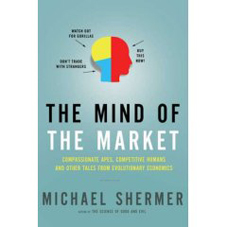The Mind of the Market: Compassionate Apes, Competitive Humans, and Other Tales from Evolutionary Economics

Competition, cooperation, and compassion all play a part in free market systems–and the use of these traits can be explained with an economic analogy to the biological science of evolution, according to Michael Shermer’s latest book, The Mind of the Market. That’s good news and bad news for humanists.
The good news is that the bulk of this book recounts truly fascinating experiments and discoveries regarding physiological components of our market decisions. Using fMRI (functional magnetic resonance imaging) of the brain, we discover that playing fair and treating each other well may be hard-wired into all but the sociopathic few. Shermer’s conclusion may even leave many humanists applauding, as he sounds a clear call for all of us to decide to behave humanely.
Some of the ethical dilemma exercises in Mind of the Market were familiar to me, but it was intriguing to read what brain scans show about the physiological effects of making certain decisions. I also found it eye-opening to read that my own propensity to cry at the slightest sentimentality in a movie, as well as my aversion to risk-taking in my retirement investments, may both be physiologically triggered.
Now for the bad news. Shermer promotes a free market that permits the cheapest goods to make it into the hands of consumers, and he chastises limitations such as antitrust laws and tariffs on foreign goods. But an entirely free market may not be the panacea Shermer claims it to be. Consumers are also producers. When laborers work for less than subsistence wages, they can’t purchase the goods being sold.
The economic equations in Mind of the Market focus on the bottom line; that is, they fail to account for non-economic factors. For example, Shermer cites a statement by economist Daniel Klein that, “all the economic reasons favor school vouchers.” While it may be less expensive to educate a student with unlicensed nuns in a parochial school, we have guaranteed, through public schools, that we will support secular education using licensed educators even though the cost may be higher. We must factor into the equation the difference between supporting someone’s religious training with government funds, and simply assuring students the ability to attain basic knowledge of the world.
The epilogue of Shermer’s book betrays earlier pages showing the effect of environment on an individual’s psychological disposition. Shermer leads us to deduce that the masses will fare terrifically in a totally free market because we are all predisposed to make decisions that benefit each other. However, both wealth and poverty are affected more by luck of birth than by what choices we make. Sure, we choose how to respond to our circumstances, but the choices available to an heiress like Paris Hilton are quite different from the choices available to the homeless man who sells me Street Sense newspaper twice a month.
These negatives aside, there is more for a humanist to love about the book than there is to dislike. Shermer’s style is accessible and easy, filled with fun analogies and a smattering of funny lines, especially if, like me, you feel compelled to read footnotes. I can even overlook Shermer’s bizarre habit of describing the physical attributes of the scientists to whom he refers. (I suppose this is his attempt to humanize geekdom.)
I certainly encourage humanist readers to get beyond the discomfort of the initial charge to look at economics as an overlapping science with evolution. We can all take comfort in the possibility that cooperation and altruism may be based in evolutionary needs. Shermer’s book might even provide a source for possible answers to theists’ who query, “Without a god-belief, what makes you moral?”
